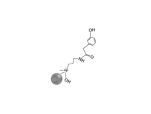Shim-pack UC-HyP; 3 µm; 150 x 2.1
Part No.: 227-32600-01
Shim-pack UC
Fully Porous Silica Particle Based Columns for Supercritical Fluid Chromatography
When conducting analysis with the Nexera UC supercritical fluid chromatography system, because diffusion of the sample band in the mobile phase is high compared with liquid chromatography, separation behavior changes significantly depending on the types of columns used. Shim-pack UC series was designed with a variety of stationary phases, making it suitable for analysis of various compounds.
Achieve high speed and high performance
Shim-pack UC series offers various stationary phases suitable for the mobile phase of high diffusion and low-viscosity liquid carbon dioxide. Analysis time can be reduced at a high flow rate without impairing the separation performance. In addition, analysis speed, which is limited in HPLC, can be increased.
Wide range of stationary phases meets diverse needs
Shim-pack UC series was designed with eight types of stationary phases and sizes to meet diverse research and development needs.
High durability and stable reproducibility
Shim-pack UC series achieves high inertness for improved analysis precision and increased column durability. Its uniform silica surface and stable chemical modification also ensure high analysis reproducibility.
Given that normal phase separation is the main separation mode used for SFC, normal phase UC-Diol and UC-Diol II columns are commonly used. They are followed by UC-Py columns that exhibit similar behavior to ethylpyridine-based columns.
UC-Diol and UC-Diol II normal phase columns can even be used for lipids and other compounds with low polarity. However, given that normal phase columns separate by class, UC-HyP columns may be better suited for separation by molecular type.
That means it may be possible to separate isomers and other compounds by SFC that are difficult to separate by HPLC. Columns with specific or multiple interaction modes may help improve separation. UC-Choles columns, which contain a rigid cholesteryl group, UC-PyE columns, which can be expected to have strong pi-pi interactions, and UC-PBr columns, which apply a dispersive force with respect to Br, can be especially effective.









